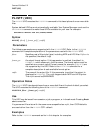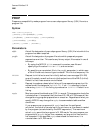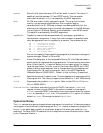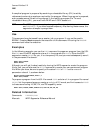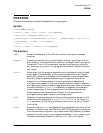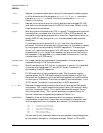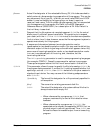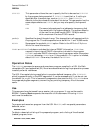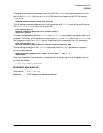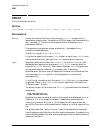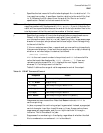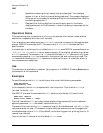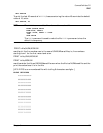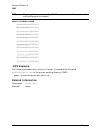
Chapter 6 439
Command Definitions P-R
PREPRUN
filename Actual file designator of the relocatable library (RL) file to be searched to
satisfy external references during preparation of the program. This can be
any permanent file of type RL, to which you must have READ and LOCK
access. It need not belong to the logon group, nor does it require a
reserved, local name. This file yields a single segment that is incorporated
into the segments of the program file. Refer to the MPE Segmenter
Reference Manual (30000-90011) for a description of RL files. Default is
that no library is searched.
NOCB Request that the file system not use stack segment (PCBX) for its control
blocks, even if sufficient space is available. This permits you to expand
your stack (with the DLSIZE or ZSIZE intrinsics) to the maximum possible
limit at a later time. It does, however, cause the file management system to
operate more slowly for this program.
quotedstring A sequence of characters between two single quotation marks
(apostrophes) or two double quotation marks. You may use the delimiting
character as part of the string so long as the delimiter appears twice. Any
occurrence of two single quotation marks, or two double quotation marks
in a row, is considered part of the string, and, therefore, not the
terminating delimiter.
The INFO=quotedstring parameter is used in some programming languages
(for example, COBOLII, Pascal) to pass compiler options to a program.
These options appear before the first line of source code in the text file.
$STDIN This parameter allows the user to specify the file to be used as $STDIN by
the program being executed. If omitted, or if nothing is specified after the
equal sign, such as $STDIN=, then $STDIN defaults to the job or session's
standard input device. You may use one of the following subparameters
with $STDIN=:
*formaldesig The formal file designator for a file previously specified in
a file equation.
fileref The name of an existing permanent disk file.
$NULL The actual file designator of a system-defined file that is
always treated as an empty file.
• When referenced by a program as $STDIN, that
program receives only an end-of-file indication when
accessed.
• When referenced by a program as $STDLIST, the
associated write request is accepted by MPE/iX, but no
physical output is actually performed. Thus, $NULL can
be used to discard unneeded output from an executing
program.




